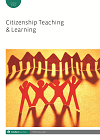
Full text loading...

In Ireland, civic, social and political education (CSPE) is a compulsory subject for all students in the first three years of post-primary education. CSPE is generally taught for one class period per week, which limits the ability to develop participatory or justice-oriented citizenship – it gives time for exposure to, but perhaps not practice of, these types of citizenship. Digital citizenship is a recently developed dimension of citizenship and is often focused only on safety and ethical elements. The changed teaching practices resulting from the COVID-19 pandemic have provided a unique opportunity to use flipped learning to develop participatory and justice-oriented digital citizenship. This article outlines examples of how two topics, promoting media literacy and conducting a survey of young people, can be taught moving from a personally responsible to a participatory and justice-oriented focus. Challenges are discussed and future research areas are suggested.

Article metrics loading...

Full text loading...
References


Publication Date:
https://doi.org/10.1386/ctl_00057_1 Published content will be available immediately after check-out or when it is released in case of a pre-order. Please make sure to be logged in to see all available purchase options.